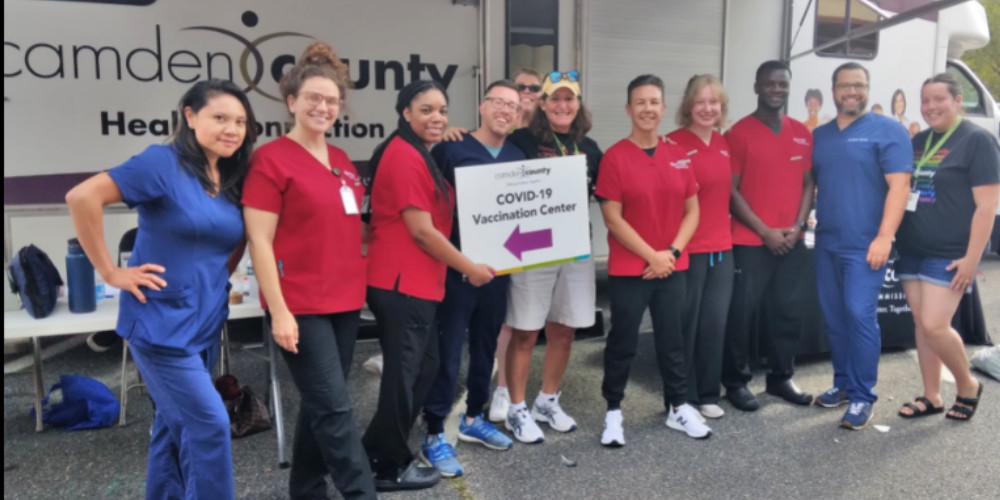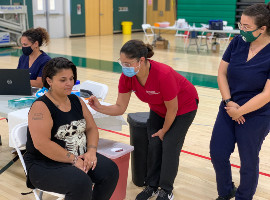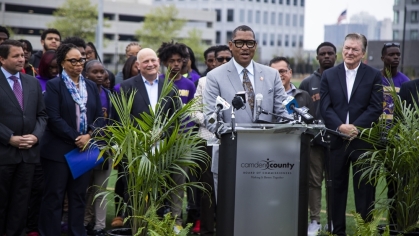Initiative to Deliver COVID-19 Vaccinations to Camden County Residents Where They Live and Congregate

Health care professionals led by Rutgers University‒Camden are making it more convenient for Camden County residents to stay healthy by offering COVID-19 vaccinations where people live, play, and worship.
Led by Kevin Emmons of the Rutgers School of Nursing‒Camden, the program targets vulnerable populations that do not have access to vaccines, and aims to educate people who are hesitant about getting a vaccine.
Team members are going door-to-door in communities where vaccination rates are low. During immunization events at churches, playgrounds, and parks, Rutgers–Camden nursing students administer the shots to people who cannot get to a vaccination site. Nursing students also answer questions about the vaccine and address fears and uncertainties about the safety and efficacy of the vaccine.
“The more accurate the information we can communicate, the more we can help improve public health,” says Emmons, a Rutgers School of Nursing–Camden associate dean and clinical associate professor.
In a festival-like setting at the immunization events, visitors can enjoy amusement games, face painting, and free ice cream from a Mister Softee truck, and then roll up a sleeve to receive the vaccine.
According The New York Times’ COVID case and risk tracker, Camden’s unvaccinated residents are at a high risk for becoming ill because of the large number of unvaccinated city residents. As of Aug. 31, at least one in eight Camden County residents has been infected by COVID-19, with a total of 60,135 reported cases since the pandemic began in March 2020.
The highly transmissible delta variant has become a major concern because it is driving up cases in areas of the United States where vaccination rates are lower.
Emmons shares with residents how the COVID-19 vaccine protects people from the delta variant. “What we are seeing is that those who contract the delta variant who are vaccinated are either asymptomatic or have mild disease,” the Rutgers–Camden educator explains. “If they are experiencing any symptoms, we know, for the most part, that being vaccinated keeps them out of the hospital.”
For people who were vaccinated months ago, third doses are being offered to residents with compromised immune systems.

At a vaccination event at Winslow High School, Archilia Ortiz (far left), a graduate nursing student checks her computer as Camila Llosa gives Vanessa Velez a shot, with clinical instructor Regina Mangano looking on.
“People with primary or acquired immunodeficiency, those on medications that suppress their immune system like those with transplant or other autoimmune disorders, we're encouraging them to get their third dose,” says Emmons.
Rutgers‒Camden nursing students offer a familiar face at the vaccination events since the students are also neighbors and members of the communities. “Having people who live in the community and know the people in the community can help to break down barriers and build trust,” says Emmons.
Since the community-focused program began in the spring, the team has vaccinated 600 Camden County residents.
The community outreach program is a collaborative effort, with Cooper University Hospital providing the vaccines and medical staff volunteers. The Camden County Department of Health and Human Services provides a large van that serves as a mobile vaccination center.
Emmons says partnerships are key to reaching unvaccinated county residents. “As we engage communities, community-based organizations and faith-based organizations help to bring us into their setting and then reach those who are hesitant about vaccination.”
The program is supported by a grant through New Jersey Health Initiatives (NJHI), a statewide grant-making program of the Robert Wood Johnson Foundation, as part of its effort to increase COVID-19 vaccination rates by identifying models for providing equitable access to the vaccines.
Emmons is in the process of applying for grants from other organizations and the state to continue offering the program into 2022. “We foresee COVID-19 being a prolonged issue, particularly with the variants, and the high rates of people not being vaccinated,” says Emmons.
The Rutgers‒Camden nursing school has been at the forefront of efforts to vaccinate South Jersey residents by assisting in the development of mass vaccination centers staffed by nursing faculty and students, and offering mobile vaccinations to at-risk populations in Camden County.


